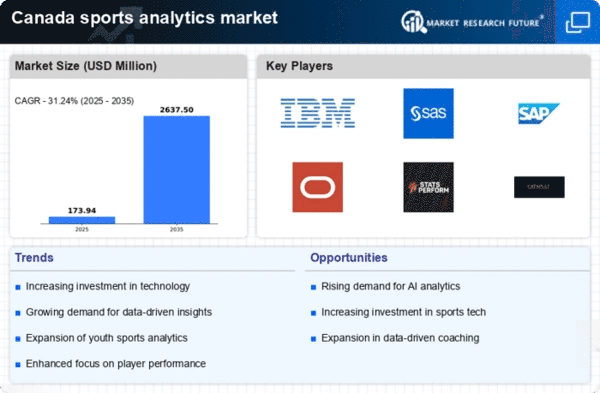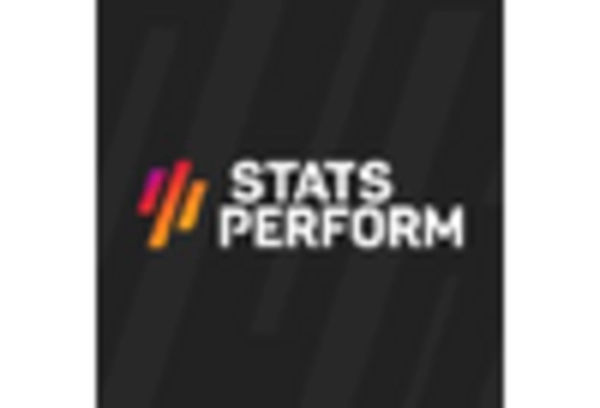Rising Popularity of Esports
The increasing popularity of esports in Canada is contributing to the expansion of the sports analytics market. As esports tournaments attract millions of viewers and participants, the demand for analytics tools to assess player performance and game strategies is on the rise. The esports sector is projected to generate revenues exceeding $1 billion by 2025, indicating a lucrative opportunity for analytics providers. Organizations are keen to utilize data analytics to enhance player training, optimize team strategies, and engage fans through personalized experiences. This trend suggests that the sports analytics market will continue to evolve, catering to the unique needs of the esports community while integrating traditional sports analytics methodologies.
Increased Focus on Injury Prevention
Injury prevention has become a critical focus within the sports analytics market, particularly in Canada, where teams are prioritizing player health and longevity. The integration of data analytics into training and rehabilitation programs is helping organizations identify risk factors and develop tailored prevention strategies. With an estimated 20% of athletes experiencing injuries each season, the demand for analytics solutions that monitor player health and performance is growing. Teams are leveraging wearable technology and data analysis to track biomechanics and workload, ultimately aiming to reduce injury rates. This heightened emphasis on injury prevention is likely to propel the sports analytics market forward, as organizations seek to protect their investments in talent and enhance overall team performance.
Integration of Artificial Intelligence
The integration of artificial intelligence (AI) into the sports analytics market is transforming how teams analyze performance and make strategic decisions. AI technologies enable organizations to process vast amounts of data quickly and accurately, providing insights that were previously unattainable. In Canada, the adoption of AI-driven analytics tools is expected to grow by 30% over the next few years, as teams seek to enhance their competitive advantage. This technological advancement allows for real-time data analysis, predictive modeling, and improved player scouting processes. As AI continues to evolve, it is likely to play a pivotal role in shaping the future of the sports analytics market, driving innovation and efficiency across various sports disciplines.
Growing Investment in Sports Technology
The sports analytics market in Canada is experiencing a surge in investment as organizations recognize the value of data-driven decision-making. With an estimated growth rate of 25% annually, stakeholders are increasingly allocating budgets towards advanced analytics tools and technologies. This trend is driven by the need for teams to enhance performance, optimize training regimens, and improve overall operational efficiency. As franchises and sports organizations invest in analytics platforms, the demand for skilled professionals in data science and analytics is also rising. This growing investment not only supports the development of innovative solutions but also fosters a competitive environment where teams leverage analytics to gain a strategic edge. Consequently, the sports analytics market is likely to expand significantly as more entities embrace technology to enhance their performance and fan engagement.
Expansion of Data-Driven Fan Experiences
The sports analytics market is witnessing a notable shift towards data-driven fan experiences in Canada. Teams and organizations are increasingly utilizing analytics to enhance fan engagement through personalized content, targeted marketing, and interactive experiences. With the rise of digital platforms, the ability to analyze fan behavior and preferences is becoming essential. It is estimated that 60% of sports organizations are investing in analytics to improve fan interactions and satisfaction. This trend indicates a growing recognition of the importance of fan loyalty and engagement in driving revenue. As teams continue to innovate and leverage data to create unique experiences, the sports analytics market is poised for substantial growth, catering to the evolving expectations of modern sports fans.

















